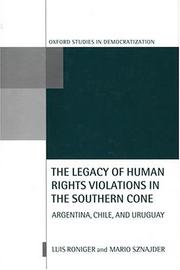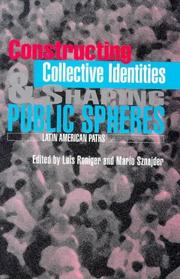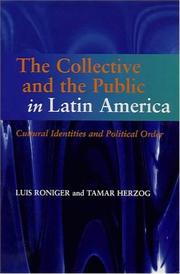| Listing 1 - 10 of 24 | << page >> |
Sort by
|
Book
ISBN: 0197605311 0197605346 019760532X 0197605338 Year: 2022 Publisher: New York, New York : Oxford University Press,
Abstract | Keywords | Export | Availability | Bookmark
 Loading...
Loading...Choose an application
- Reference Manager
- EndNote
- RefWorks (Direct export to RefWorks)
Latin America is a region made up of multiple states with a diversity of races, ethnicities, and cultures. In Transnational Perspectives on Latin America, Luis Roniger argues that a regional perspective is significant for understanding this part of the Western hemisphere. He claims that geopolitical, sociological, and cultural trends molded a contiguity of influences, shaping a transnational arena of connected histories, cross-border interactions, and shared visions, complementing the process of separate nation-state formation.
Book
ISBN: 607628496X 9786076284964 Year: 2018 Publisher: Ciudad de México, México : El Colegio de México,
Abstract | Keywords | Export | Availability | Bookmark
 Loading...
Loading...Choose an application
- Reference Manager
- EndNote
- RefWorks (Direct export to RefWorks)
Human rights --- Derechos humanos --- Derechos civiles --- History --- Historia --- Leyes y legislación
Book
ISBN: 9786076283691 Year: 2018 Publisher: Ciudad de México : El Colegio de México,
Abstract | Keywords | Export | Availability | Bookmark
 Loading...
Loading...Choose an application
- Reference Manager
- EndNote
- RefWorks (Direct export to RefWorks)
Los derechos humanos en América Latina revelan avances y retrocesos en la progresiva, aunque todavía incompleta, articulación entre discursos,normas y prácticas de protección a esos derechos fundamentales de las personas,al respeto a su integridad física y a su dignidad.De manera sistemática, este libro registra esos procesos,siguiendo una perspectiva que contempla los anclajes legales y culturales, así como los debates teóricos y políticos, en el marco de realidades sociales,políticas y económicas que han condicionado su efectiva implementación.En un esfuerzo de síntesis sin precedentes, esta obra revisa a historia de un asunto medular en la construcción del moderno orden político en América Latina. Un asunto que se proyecta hasta nuestros días con una urgencia fuera de cualquier duda.
Human rights --- History.

ISBN: 0198296150 9780198296157 Year: 2003 Publisher: Oxford Oxford University Press
Abstract | Keywords | Export | Availability | Bookmark
 Loading...
Loading...Choose an application
- Reference Manager
- EndNote
- RefWorks (Direct export to RefWorks)
Human rights --- Argentina --- Chile --- Uruguay --- State-sponsored terrorism --- Memory --- Group identity --- Psychological aspects --- Social aspects --- Human rights - Argentina --- Human rights - Chile --- Human rights - Uruguay --- State-sponsored terrorism - Southern Cone of South America - Psychological aspects --- Memory - Social aspects - Southern Cone of South America --- Group identity - Southern Cone of South America
Book
ISBN: 1280815078 Year: 1999 Publisher: Oxford : Oxford University Press,
Abstract | Keywords | Export | Availability | Bookmark
 Loading...
Loading...Choose an application
- Reference Manager
- EndNote
- RefWorks (Direct export to RefWorks)
Here, case studies of Argentina, Chile and Uruguay analyse the struggles and debates, and the institutional paths and crises that took place in these societies following re-democratization.
Human rights --- State-sponsored terrorism --- Memory --- Group identity --- Human Rights --- Law, Politics & Government --- Psychological aspects --- Social aspects --- Collective identity --- Community identity --- Cultural identity --- Social identity --- Identity (Psychology) --- Social psychology --- Collective memory --- Retention (Psychology) --- Intellect --- Psychology --- Thought and thinking --- Comprehension --- Executive functions (Neuropsychology) --- Mnemonics --- Perseveration (Psychology) --- Reproduction (Psychology) --- Government violence --- Governmental violence --- State-sponsored violence --- State terrorism --- Violence, Governmental --- Violence, State-sponsored --- Political atrocities --- Terrorism --- Basic rights --- Civil rights (International law) --- Rights, Human --- Rights of man --- Human security --- Transitional justice --- Truth commissions --- Law and legislation
Book
ISBN: 9781316501122 9780511581373 9780521517355 0511581378 9780511539794 0511539797 9780511540738 0511540736 0521517354 9780511538957 0511538952 9780511538957 1316501124 1107191351 1282155636 9786612155635 0511540396 051153812X Year: 2009 Publisher: Cambridge New York
Abstract | Keywords | Export | Availability | Bookmark
 Loading...
Loading...Choose an application
- Reference Manager
- EndNote
- RefWorks (Direct export to RefWorks)
The Politics of Exile in Latin America addresses exile as a major mechanism of institutional exclusion used by all types of governments in the region against their own citizens, while they often provided asylum to aliens fleeing persecution. The work is the first systematic analysis of Latin American exile on a continental and transnational basis and on a long-term perspective. It traces variations in the saliency of exile among different expelling and receiving countries; across different periods; with different paths of exile, both elite and massive; and under authoritarian and democratic contexts. The project integrates theoretical hindsight and empirical findings, analyzing the importance of exile as a recent and contemporary phenomenon, while reaching back to its origins and phases of development. It also addresses presidential exile, the formation of Latin American communities of exiles worldwide, and the role of exiles in shaping the collective identities of these countries.
Exile (Punishment) --- Exiles --- Statelessness --- Psychology. --- Social conditions. --- Latin America --- Politics and government. --- Citizenship --- Public law --- Expatriation --- Stateless persons --- Persons --- Aliens --- Deportees --- Refugees --- Banishment --- Deportation as a punishment --- Ostracism (Exile) --- Alternatives to imprisonment --- Law and legislation --- Social Sciences --- Political Science

ISBN: 189872377X Year: 1998 Publisher: Brighton Sussex Academic Press
Abstract | Keywords | Export | Availability | Bookmark
 Loading...
Loading...Choose an application
- Reference Manager
- EndNote
- RefWorks (Direct export to RefWorks)

ISBN: 1902210131 Year: 2000 Publisher: Brighton Sussex Academic Press
Abstract | Keywords | Export | Availability | Bookmark
 Loading...
Loading...Choose an application
- Reference Manager
- EndNote
- RefWorks (Direct export to RefWorks)
History of Latin America --- anno 1500-1799 --- anno 1800-1999
Book
Year: 2019 Publisher: Pittsburgh, Estados Unidos : Latin American Research Commons,
Abstract | Keywords | Export | Availability | Bookmark
 Loading...
Loading...Choose an application
- Reference Manager
- EndNote
- RefWorks (Direct export to RefWorks)
"Este libro reflexiona desde las ciencias sociales, la historia social y la historia de las ideas acerca de la amplia presencia de narrativas conspirativas en América Latina. Los autores distinguen entre la existencia de complots--algunos exitosos, otros fracasados--de otro fenómeno paralelo: las teorías conspirativas que interpretan el mundo como objeto de siniestras maquinaciones e intrigas clandestinas. Se trata de una lógica epistemológica, cuya visión de mundo y narrativa argumentativa fungen de mito movilizador de fuerzas políticas y sociales"--
Conspiracy theories. --- Latin America --- Politics and government
Book
Year: 2019 Publisher: Pittsburgh : Latin American Research Commons,
Abstract | Keywords | Export | Availability | Bookmark
 Loading...
Loading...Choose an application
- Reference Manager
- EndNote
- RefWorks (Direct export to RefWorks)
Este libro reflexiona desde las ciencias sociales, la historia social y la historia de las ideas acerca de la amplia presencia de narrativas conspirativas en América Latina. Los autores distinguen entre la existencia de complots--algunos exitosos, otros fracasados--de otro fenómeno paralelo: las teorías conspirativas que interpretan el mundo como objeto de siniestras maquinaciones e intrigas clandestinas. Se trata de una lógica epistemológica, cuya visión de mundo y narrativa argumentativa fungen de mito movilizador de fuerzas políticas y sociales.
| Listing 1 - 10 of 24 | << page >> |
Sort by
|

 Search
Search Feedback
Feedback About UniCat
About UniCat  Help
Help News
News